Online Event Symposium
Design with the Living 2021
How do we design for a planetary emergency? Join this two-day symposium to discuss how designing with and for living systems can shape our future.
What to expect
Join our third annual symposium to explore how a living systems thinking approach to design can nurture a radical mindset where multi-species creative collaborations can contribute to planetary heath.
This symposium aims to participate in shaping an ecological blueprint for future biodesign practice. It is co-organised by the Design Museum, the Living Systems Lab (Central Saint Martins UAL) and The Bio ID Lab (Bartlett School of Architecture, UCL).
The event will bring together a range of perspectives from designers, scientists, researchers, ecologists, architects, and ask: is biodesign truly addressing planetary challenges, or is biodesign perpetuating a mindset of natural exploitation and business as usual? Can biodesign adopt multi-species thinking? Should this design approach become the norm?
A place for critical review as well as mindful and ethical reflection, the symposium will be structured around 4 panels that will interrogate the practice of biodesign in relation to:
- Design for biodiversity
- Design for circularity
- Design for inclusive futures
Design for extreme climate and environments
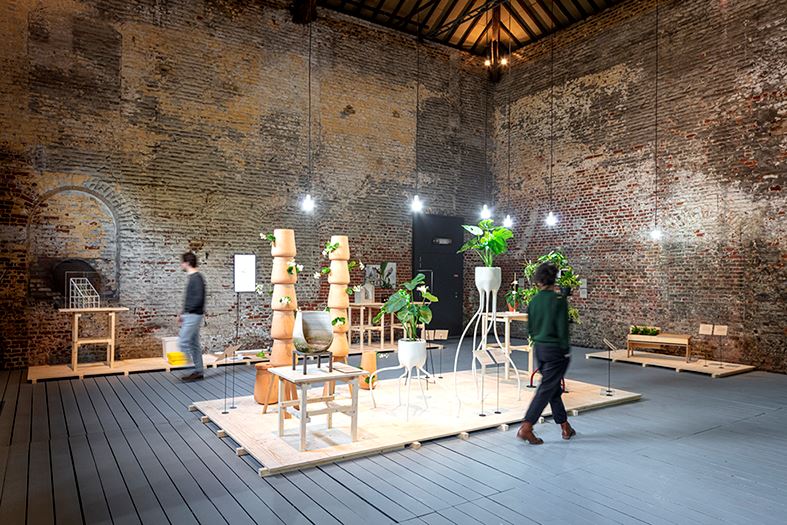
Plant Fever: Towards a Phyto-centred Design – a travelling exhibition by studio d-o-t-s, image by Tim Van de Velde CID au Grand-Hornu
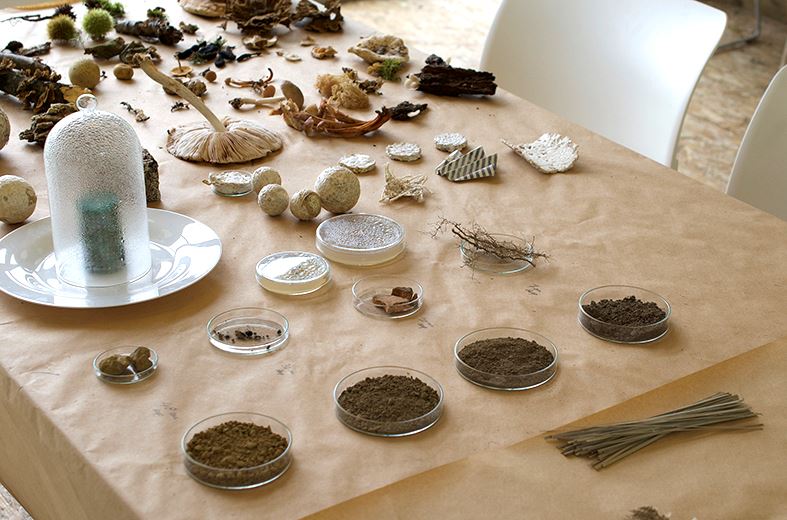
Porject by Miriam Josi and Stella Lee Prowse
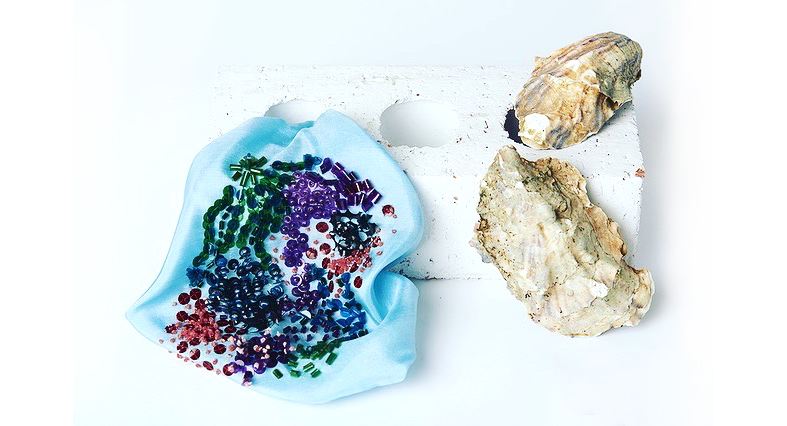
Project by Cassie Quinn
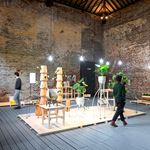
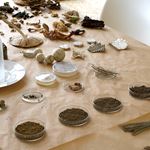
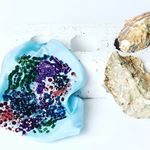
The Programme
Day 1: THURSDAY 4 NOVEMBER 13:00 - 17:30
PANEL 1: Biodiversity 13.15 - 15.00
How can designing with living systems help restore degraded ecologies and nurture biodiversity?
PANEL 2: Circularity 15.15 - 17.00
How can biodesign accelerate the circular economy to create value from waste?
.
Day 2: FRIDAY 5 NOVEMBER 13:00 - 17:30
PANEL 3: Climate and extreme environments 13.15 - 15.00
How can living system thinking help us design for disrupted climate and extreme environments?
PANEL 4: Inclusive futures 15.15 - 17.00
How can biodesign help foster community and create manufacturing processes that generate meaningful employment?
Speakers
Anete Salmane
Anete is a laboratory coordinator and a tutor in the Bio-Integrated Design programme at the Bartlett School of Architecture, UCL. Building upon her background in biology, her research interests lie at the intersection of biomateriality and methods of fabrication using biological components.
Anthony Acciavatti
Anthony works at the intersection of architecture and the history of science and technology. He is the author of the award-winning book, Ganges Water Machine (2015), which is based on a decade of crisscrossing the Ganges by foot, boat and car. He teaches at Yale University and is a founding partner of Somatic Collaborative.
Brigitte Kock
Brigitte is a digital designer interested in creating parametric and interactive systems. She aims to go beyond ‘sustainability' and create regenerative systems — products that not only do less harm, but actively improve the environment, whilst improving our way of living at the same time.
Cassie Quinn
Cassie Quinn has a background in fashion with a focus on embroidery and textile design. She is the founder of CQ Studio which focuses on the R&D of regenerative, local textiles and utilising waste to create new products. Currently she is working on new research funded by the UAL Mead Fellowship Award.
Duncan Cameron
Duncan is Professor of Plant and Soil Siology and Co-Director of The Institute for Sustainable Food at the University of Sheffield. As an environmental microbiologist and biological chemist his research uses multi omics approaches to investigate how soil microbes enhance plant nutrition and health in the context of sustainable agriculture and global food security.
Ehab Sayed
Founder of Biohm, Board Member of Fast Forward 2030 and PhD Researcher at Northumbria University, Ehab is a regenerative design engineer, circular economy strategist and built environment innovator. He is Climate-KIC Certified, Unreasonable Group fellow, and member of the Alliance for Sustainable Building Products, the Circular Economy Club and UKGBC.
Frédéric Migayrou
Frédéric is Deputy Director of the Musée National d'Art Moderne, Centre de Création Industrielle at the Centre Pompidou Paris and Chair of the Bartlett School of Architecture, UCL. He founded both the Frac Center Collection and ArchiLab. He has curated international architecture exhibitions, including Bernard Tschumi, Naturalising Architecture, Frank Gehry, and Le Corbusier.
Harry Watkins
Harry Watkins is Director of St Andrews Botanic Garden, where his research focuses on ecological forecasting in novel ecosystems. He applies this research to questions of adaptation to climate change and biosecurity risks in a suite of projects in threatened or sensitive landscapes, most notably in the Tangled Bank at the Botanic Garden.
Henna Burney
Henna is a product and material designer working on research and material development. After an MA project exploring the valorisation of waste products from rice industries at Ecole Boulle, she joined Atelier LUMA in 2017 as a project manager. Henna’s work focuses on local resources such as salt, sunflower and clay and linking this research with scientific institutions.
Irene Roca Moracia
Irene Roca Moracia is an architect and designer from Spain whose practice rethinks abandoned and empty European structures. She believes the scale in which we play with materials and furniture in domestic interiors allows us to test complex ideas around sustainability and social issues in a more dynamic way than architecture.
Julia Jueckstock
Julia is a multi-disciplinary designer who breaks down silos to create innovative experiences that leave a positive impact. Most recently, she has been exploring the intersection of art, science and design in order to articulate alternative sustainable solutions that redefine how we create in the future.
Justin McGuirk
Justin is the Design Museum’s Chief Curator. He has been director of Strelka Press, The Guardian's design critic, and Head of Design Curating and Writing at Design Academy Eindhoven. He has lectured internationally, and is a former winner of the Golden Lion at the Venice Biennale. His book 'Radical Cities: Across Latin America in Search of a New Architecture' is published by Verso.
Lara Drouet and Olivier Lacrouts
Lara Drouet and Olivier Lacrouts founded studio d-o-t-s in 2014, a research-led studio active in the field of editorial and curatorial production. The studio’s work focuses on alternative social dynamics and experimental design. Defined by participatory and interdisciplinary approaches, their work ranges from writing and exhibition-making to educational workshops.
Miriam Josi and Stella Lee Prowse
Miriam Josi and Stella Lee Prowse are designers and collaborators based in Paris. They recently completed a Master of Science in Nature Inspired Design at Ensci-les Atelier. Their joint work explores the ethics and principles of bio-collaboration through a bio-inclusive philosophy to imagine new fabrication processes that benefit the more-than-human.
Monika Brandic Lipinska
Monika is a PhD candidate at the Hub for Biotechnology in the Built Environment at Newcastle University, researching growth as an alternative approach for constructing extra-terrestrial habitats in collaboration with NASA Ames Research Center. Also a co-founder of Bio-Futures for Transplanetary Habitats, studying biosocial and biotechnological relations in space and extreme environments.
Orkan Telhan
Orkan investigates critical issues in cultural, environmental and social responsibility. Telhan is Associate Professor of Fine Arts - Emerging Design Practices at the University of Pennsylvania, Weitzman School of Design, and a cofounder of Biorealize Inc. He holds a PhD in Design and Computation from MIT's Department of Architecture.
Paula Camiña Eiras
Paula is a biodesign researcher who graduated in Industrial Design Engineering and Product Development in 2018. Her research concerns how biodesign can make a positive ecological, scientific, and cultural impact. Her most recent project saw her collaborate with Galician basketmakers to use biotechniques to help regenerate and revive Galician craft heritage.
Peg Rawes
Peg is Professor of Architecture and Philosophy at the Bartlett School of Architecture. Her research focuses on material, political, and ecological histories and theories of architecture and art. She is the author of Space Geometry and Aesthetics (2008) and Irigaray for Architects (2007).
Prantar Mahanta Tamuli
Prantar is an architect and designer currently pursuing a PhD in Biochemical Engineering, at Bio-ID, UCL. His focus has been on the development of a novel photosynthetic biomineralized engineered living material with cyanobacteria that can facilitate biologically active carbon negative architecture.
Dr. Raquel Prado
Dr. Raquel Prado is Head of Research and Sustainability at Ananas Anam. She holds a PhD in renewable materials engineering and a degree in Chemistry. Her academic research had been focused on sustainable chemistry applied to biorefinery processes.
Tiago Almeida
Tiago is a Portuguese product designer/maker who graduated from Fine Arts University in Lisbon. Using wood as a main medium, he has been questioning the different processes for creating furniture and objects sustainably. After 10 years exploring with materials, Tiago joined atelier LUMA in 2020 to develop new ways of transforming co-products adapting usual methods.
Buy online
Booking information
ONLINE EVENT
Adult: £25
Student/Concession £15
Members: £10
Student Members: £8
Related exhibition
Background image: BIO ID Lab project / Waste Age: What can design do? exhibition.